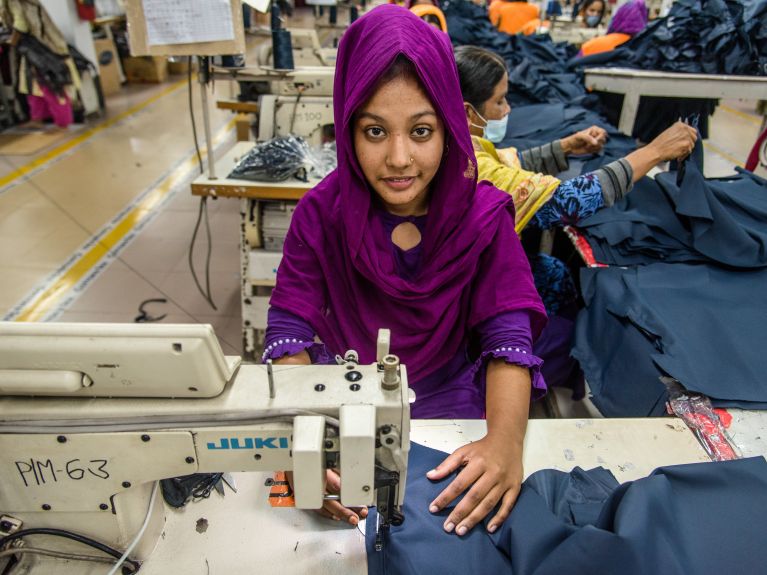Supply Chain Act protects people worldwide
Companies in Germany are required to observe human rights in their international supply chains.

Many millions of people in the world suffer hardship because they are paid far too little for their work and minimum social standards are disregarded. This includes failing to observe the ban on forced labour and child labour. Almost 80 million children worldwide work under exploitative conditions in textile factories, mines, quarries and plantations. Would you like to find out how the Federal Government and German industry are committed to upholding minimum social standards? See here for the answers:
How does Germany support minimum social standards globally?
One means of combating inhumane conditions is the Supply Chain Act. It will apply in Germany from 2023 onwards, initially to companies with more than 3,000 employees. The aim is to protect human rights in international supply chains. The new law requires companies to respond to grievances in the purchase of materials from abroad and enables aid organisations and trade unions to represent victims of violations before German courts.
Which companies does the Supply Chain Act apply to?
The “Act on Corporate Due Diligence Obligations in Supply Chains”, as it is officially called, initially applies to companies with more than 3,000 employees. According to the Federal Minister for Economic Cooperation and Development (BMZ), Svenja Schulze, some 900 companies are affected. Various requirements apply to them and their business area, also including both direct and indirect suppliers.
How does the Supply Chain Act affect companies?
In principle, they must ensure that human rights are respected throughout their supply chains. Their due diligence essentially extends to the entire supply chain – from the raw materials through to the finished sales product. The requirements are differentiated according to the companies’ ability to influence the perpetrator of the human rights violation and the various stages in the supply chain.
What are companies required to do under the Supply Chain Act?
According to the BMZ, requirements including carrying out a risk analysis, setting up a risk management system and a grievance mechanism, and reporting on these publicly. In the case of violations in their own business area or by direct suppliers, companies must take prompt action “to prevent, stop or minimise the extent of the violation”.
How is compliance with the Supply Chain Act monitored?
The Federal Office for Economic Affairs and Export Control (BAFA) checks whether companies are complying with the law. It monitors company reports and investigates complaints. If BAFA finds omissions or violations, it can impose fines or exclude companies from public procurement in Germany.
Does the Supply Chain Act affect foreign companies in Germany, too?
Branches of foreign companies that are based in Germany are also subject to the law. The deciding factor here is the number of employees in Germany; the same rules apply as for German companies.
What will change in the German Supply Chain Act in 2024?
From 2024 onwards, the law will also apply to companies with 1,000 employees or more. There are some 4,800 companies of this size in Germany. Small and medium-sized enterprises are not subject to the law.
How does the Supply Chain Act help people abroad?
Victims of human rights violations abroad who work directly or indirectly for German companies or companies based in Germany can continue to assert their rights before German courts. In addition, they can submit a complaint to the Federal Office for Economic Affairs and Export Control (BAFA). German trade unions and NGOs are allowed to support individuals affected who come from other countries in representing their rights before German courts.


